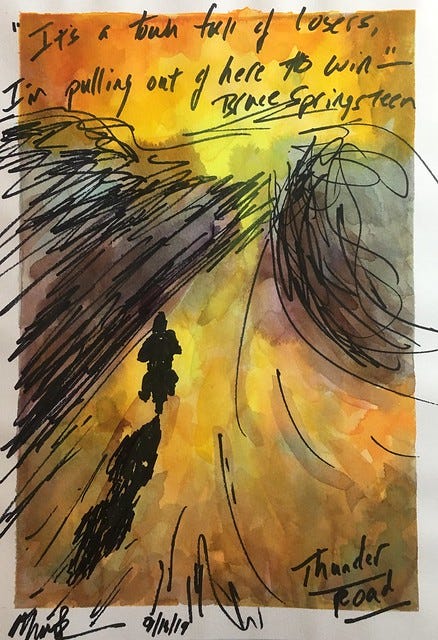RWL Newsletter #141 - monkeys, power poses, and brain injury

Greetings from the University of New Hampshire! I came across this wonderful quote from David Hume earlier this week:
"A man acquainted with history may, in some respect, be said to have lived from the beginning of the world, and to have been making continual additions to his stock of knowledge in every century." -David Hume, Essays, Moral, Political, and Literary
It reminded me that I have fallen flat on my 2019 New Year’s resolution to read a classic text (for me, defined as a text at least 1,000 years old that is still influential) every month for the year. I made it through 3.5 of them, and it’s now 9.5 months in. I always have ambitions to do so much and I look back and I have accomplished so little, I don’t know where the time goes.
I was inspired to start that project based on the comments I heard at a conference, with a scholar saying that reading someone’s book is the closest thing you can get to to inhabiting their mind. An article I read talking about why to read old philosophers is not to try to learn what they said, but how they think through a problem. So the point is to learn to think like Aristotle, not to necessarily memorize Aristotle’s specific arguments (or Hume’s). I think that is also the value of knowing some history, coming back to the Hume quote. It’s not to know the facts, but to learn some wisdom, having inhabited the minds and perhaps moments of other peoples.
(picture is a pen and watercolor homage to the Boss I did this week for a friend)
On to the links!
Read
What: HBR, Who’s Got the Monkey? By Oncken and Wass
http://www.mcrhrdi.gov.in/91fc/coursematerial/management/17%20Who%20Has%20Got%20The%20Monkey.pdf
Why: I’ve been working with a physician leadership program for the last couple of years, both as an instructor and as a researcher, and in the researcher role I had the opportunity to interview a physician the other day who has been in a leadership role now for about a year and still learning how to perform her new responsibilities. One of the things she admitted she struggles with is the temptation to solve all her employee’s problems. This is a classic problem, particularly for new managers. And as she was telling me about it, I was thinking of this classic article by Oncken and Wass about how to work through this problem. In today’s world of work, managers need to be able to have employees solve problems on their own. Gone are the days of the command economy. Managers have to teach their employees to solve problems on their own, and managers have to take a role of empowering and assisting employees in solving their own problems, not solving them for them. Some great advice in this article to keep managers sane.
Watch
What: TED, Your body language may shape who you are, Amy Cuddy (21 min)
Why: My management students have been giving presentations as part of the course, and have been a bit surprised by my emphasis on style and presence as much as on content. The point I am trying to drive home to them is your style can help or hinder the delivery of your content, so it really does matter. Some students from a couple of semesters ago found this TED talk and shared it with me, so as I was trying to deal with the push-back from my students about style, I thought of this video. I’ve shared it with them as an optional view, and I thought I’d share it this week (hopefully I haven’t shared it in the past - or at least not too recently).
Listen
What: Health Leader Forge, Lisa Couture, Executive Director, Krempels Center
https://healthleaderforge.blogspot.com/2019/09/lisa-couture-executive-director.html
Why: My latest Health Leader Forge interview is with Lisa Couture, MSW, the Executive Director of the Krempels Center. The Krempels Center is located in Portsmouth, NH, and provides community-based programming and therapy for adults with acquired brain injury. I’ve spent some time visiting the Center and it’s really inspiring to see the work they are doing, and the impact they have on the lives of their members. The Krempels Center is a classic, grass-roots non-profit, founded by David Krempels after he suffered a brain injury as the result of a car accident, and discovered that there were few resources for people after they had left the inpatient setting.
Lisa herself has had an interesting career, winding her way through a variety of non-profits, working in special needs education, homelessness, and finally landing at the Krempels Center nine years ago. We talk about what it is like to work and lead in non-profits at various stages of their maturation as organizations - from founding stages to mature organizations.
Thanks for reading and see you next week! If you come across any interesting stories, won't you send them my way? I'd love to hear what you think of these suggestions, and I'd love to get suggestions from you. Feel free to drop me a line at mark.bonica@unh.edu , or you can tweet to me at @mbonica .
Also, if you find these links interesting, won’t you tell a friend? They can subscribe here: https://tinyletter.com/markbonica
Have a great weekend and do amazing things!
Mark
Mark J. Bonica, Ph.D., MBA, MS
Assistant Professor
Department of Health Management and Policy
University of New Hampshire
(603) 862-0598
mark.bonica@unh.edu
Health Leader Forge Podcast: http://healthleaderforge.org
"I know of no more encouraging fact than the unquestionable ability of man to elevate his life by a conscious endeavor." - Henry David Thoreau


